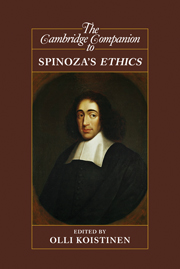Book contents
- Frontmatter
- Introduction
- 1 The Textual History of Spinoza’s Ethics
- 2 The Geometrical Order in the Ethics
- 3 Spinoza’s Ontology
- 4 Substance Monism and Identity Theory in Spinoza
- 5 Spinoza and the Stoics on Substance Monism
- 6 Spinoza on Necessity
- 7 Knowledge in Spinoza’s Ethics
- 8 Spinoza on Action
- 9 The Anatomy of the Passions
- 10 Freedom, Slavery, and the Passions
- 11 Spinoza’s Theory of the Good
- 12 The Power of Reason in Spinoza
- 13 Spinoza on the Essence of the Human Body and the Part of the Mind That Is Eternal
- Bibliography
- Index
3 - Spinoza’s Ontology
Published online by Cambridge University Press: 28 March 2010
- Frontmatter
- Introduction
- 1 The Textual History of Spinoza’s Ethics
- 2 The Geometrical Order in the Ethics
- 3 Spinoza’s Ontology
- 4 Substance Monism and Identity Theory in Spinoza
- 5 Spinoza and the Stoics on Substance Monism
- 6 Spinoza on Necessity
- 7 Knowledge in Spinoza’s Ethics
- 8 Spinoza on Action
- 9 The Anatomy of the Passions
- 10 Freedom, Slavery, and the Passions
- 11 Spinoza’s Theory of the Good
- 12 The Power of Reason in Spinoza
- 13 Spinoza on the Essence of the Human Body and the Part of the Mind That Is Eternal
- Bibliography
- Index
Summary
In the opening definitions of the Ethics Spinoza mentions three kinds of basic entities, substance, mode, and attribute, after defining which he is quickly on the way to building his metaphysical system. In what follows, I present the basics of Spinoza's ontology and attempt to go some distance toward clarifying its most pertinent problems. I start by considering the relationship between the concepts of substance and mode; my aim is to show that despite his somewhat peculiar vocabulary there is much here that we should find rather familiar and intelligible, as Spinoza's understanding of these matters harks back to the traditional distinction of substance and accident, or thing and property. After this I move on to fitting the concept of attribute into Spinoza's conceptual architecture, and then examine the implications concerning real existents and causation that Spinoza sees these fundamental conceptual commitments as having. The most startling of these implications is of course his monism, according to which there is only one substance. Through this examination it becomes clear that it is only when Spinoza makes the transition from considerations concerning concepts to existential claims that the collision with what was previously commonly accepted becomes inevitable.
- Type
- Chapter
- Information
- The Cambridge Companion to Spinoza's Ethics , pp. 56 - 78Publisher: Cambridge University PressPrint publication year: 2009
- 4
- Cited by



